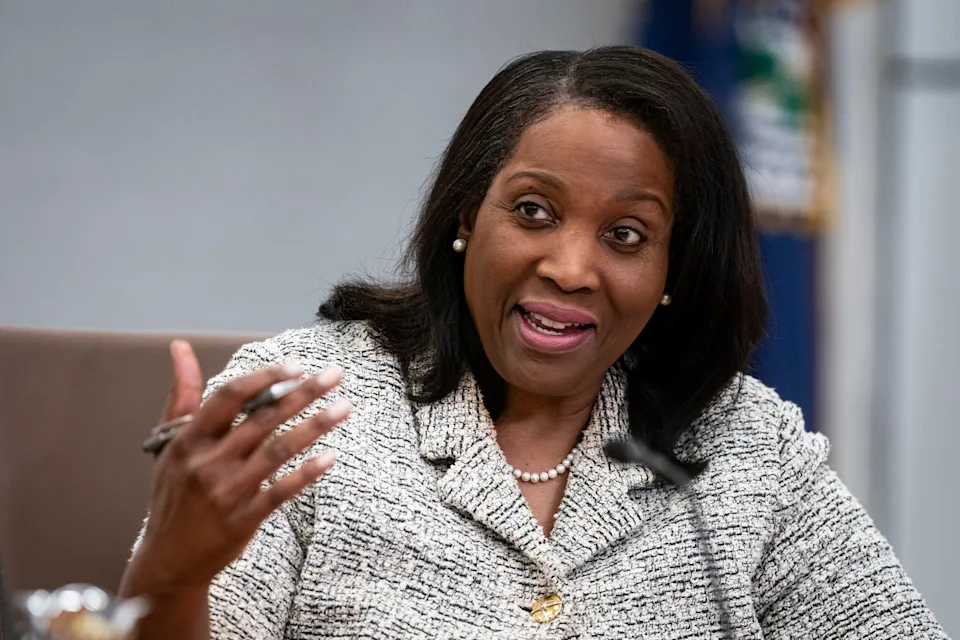A judge temporarily blocked President Donald Trump from removing Federal Reserve Governor Lisa Cook, allowing her to remain on the job as she challenges the president’s efforts to oust her over allegations of mortgage fraud.
In an early win for the embattled economist, US District Judge Jia Cobb in Washington granted Cook’s request to continue working for now. The ruling means Cook can likely attend a highly anticipated Fed policy meeting Sept. 16-17 to vote on whether to lower interest rates.
The Justice Department is likely to swiftly appeal the ruling and the US Supreme Court may ultimately have the final say.
The judge concluded that the alleged mortgage misconduct likely didn’t amount to “cause” to fire her under the Federal Reserve Act, and that the way in which she was dismissed likely violated her due process rights under the Constitution.
“The best reading of the ‘for cause’ provision is that the bases for removal of a member of the Board of Governors are limited to grounds concerning a Governor’s behavior in office and whether they have been faithfully and effectively executing their statutory duties,” the judge wrote.
Cook’s lawyer Abbe Lowell said in a statement that Cobb’s decision “recognizes and reaffirms” the Fed’s independence from political interference.
“Allowing the president to unlawfully remove Governor Cook on unsubstantiated and vague allegations would endanger the stability of our financial system and undermine the rule of law,” Lowell said.
A Fed spokesperson declined to comment. The agency hasn’t taken a side in the legal fight and has said it will respect the court’s decision.
The Justice Department said that it doesn’t “comment on current or prospective litigation including matters that may be an investigation.”
The White House didn’t immediately respond to a request for comment on the decision Tuesday evening.
Mortgage Fraud Allegations
Trump said last month he was firing Cook after Federal Housing Finance Agency Director Bill Pulte accused her of fraudulently listing homes in Michigan and Georgia as a “primary residence” when she obtained mortgages in 2021 to secure more favorable terms on loans. Pulte later added a claim involving a third mortgage in Massachusetts.
The fight over whether Cook can keep her job has quickly emerged as the main flash point in Trump’s bid to assert more control over the Fed, which he has repeatedly called on to lower interest rates. In her lawsuit, Cook’s lawyer cast his attempt to fire her as a power grab that could cause “irreparable harm” to the US economy. Her lawyer has also said she never committed mortgage fraud.
Cook has alleged that Trump’s move to oust her is part of a politically motivated pattern. The president had previously considered an attempt to force out Fed Chair Jerome Powell after attacking him for not moving quickly enough to reduce interest rates.
Unintentional ‘Clerical Error’
Her lawyers said that if there were any errors, she didn’t mean to deceive anyone, and no one was harmed. They have also suggested that an unintentional “clerical error” may be to blame and that the allegations were a pretext by Trump to remove her.
Following Pulte’s allegations, which he referred to the Justice Department, Trump wrote a letter to Cook saying that he was removing her immediately in light of her “deceitful and potentially criminal conduct in a financial matter.”
Meanwhile, the Justice Department has opened a criminal probe into whether Cook committed mortgage fraud.
In the ruling, the judge said that Pulte’s allegations in a social-media post, and Trump’s later social media post announcing his intention to dismiss Cook, didn’t amount to a proper notice of the allegations against Cook.
Cobb denied a request by the Justice Department to pause her ruling while it pursues an expected appeal, immediately teeing it up for the administration to take the case to higher courts.
Cobb also agreed for now that the public interest in Fed independence “weighs in favor of Cook’s reinstatement.” That independence is critical in helping the nation’s “banking system to promote stability,” Cobb said.

